40 gr Pea Shoots
40 gr Broccoli
20 gr Red Radish
A serving of 100 grams of pea shoots contains:- 4 grams of protein
- 3 grams of fiber
40 gr Pea Shoots
40 gr Broccoli
20 gr Red Radish
A serving of 100 grams of pea shoots contains:
- 4 grams of protein
- 3 grams of fiber
- 280 micrograms of vitamin K
- 79 milligrams of vitamin C
- 340 micrograms of vitamin A
Pea shoots, also known as pea tendrils or pea greens, are the small leaves and vine tips of a common variety of pea plants. While peas are part of the legume family, pea shoots are eaten and prepared like other leafy vegetables.
Pea shoots are different from pea sprouts, which are just-sprouting plants. Pea shoots look like large long-stemmed clovers with broad, round leaves.
Pea shoots taste similar to pea seeds but with a little more of an earthy taste. They’re considered a microgreen but are often more expensive than typical microgreens because they go bad much quicker.
What Are the Health Benefits of Pea Shoots?
Just like peas, pea shoots offer many nutritional benefits. While low in macronutrients like carbs and fats, pea shoots contain a good amount of protein and fiber. They are also rich in vitamins.
Vitamin K: One 100-gram serving of pea shoots offers 267% of your recommended daily allowance. Vitamin K helps build bones and is essential for blood clotting. About 67% of the U.S. population doesn’t get enough vitamin K in their diet.
Vitamin C: The amount of vitamin C in 100 grams of pea shoots is 76% of your recommended daily allowance. Vitamin C, also called ascorbic acid, plays a role in forming blood vessels, cartilage, collagen, and muscle and also helps your body heal. Your body can’t produce vitamin C on its own, and almost 40% of people don’t get enough of it in their diet.
Vitamin A: One 100-gram serving of pea shoots contains 43% of your daily recommended allowance of vitamin A. Vitamin A is an antioxidant and aids in growth, vision, reproduction, and cell division. About 43% of people are deficient in vitamin A.
Eating 100 grams of pea shoots will also give you 37% of your recommended daily intake of manganese, 24% of vitamin E, and 23% of folate.
Eating 1 cup of pea shoot microgreens will also give you 10 % of your recommended daily intake. How vital is iron? Iron is used to carry oxygen around and acts as an important cofactor in many of the body’s metabolic pathways. The most prevalent disorder caused by iron deficiency is anemia. The high iron content of pea shoots helps to address this and provides a better alternative than meat.
How to Cook and Eat Pea Shoots
Most people eat pea shoots raw, but you can also cook them. Before preparing pea shots, remove wilted leaves and tough ends or stems. Rinse them in cold water to prevent wilting leaves. Take care to lift and swirl them to get out any dirt or grit. Dry them on a paper towel or with a salad spinner.
If you aren’t using your pea shoots immediately, you can store them in the fridge for a day or two. Wrap the pea shoots in paper towels, put them in a plastic bag, and store them in the vegetable drawer of your refrigerator. Pea shoots don’t freeze well, so keep them above 28°F.
Raw pea shoots are great in salads and sandwiches. When cooked, they work great as a side dish, in stir-fry dishes, or as a replacement for spinach in pasta and casseroles. If you want to cook pea shoots, use methods like steaming and sautéing. Pea shoots cook down about 90% in volume, so if you’re cooking them, you’ll need a lot.
Kids Favorite Microgreens
Sunflower microgreens contain a rich supply of vitamins and minerals, with some varieties containing more than the adult equivalent of their respective mature vegetables.
According to USDA’s sunflower microgreens nutrition data, a 64 g serving of sunflower microgreens will provide:
- 25 calories
- 2 g of protein
- 4 g of carbohydrate
- 2 g of fiber
- 80 milligrams (mg) of calcium
- 14.4 mg of iron
- 60 mg of magnesium
- 80 mg of phosphorus
- 270 mg of potassium
- 10 mg of sodium
- 0.6 mg of zinc
- 9 mg of vitamin C
- 40 micrograms (mcg) of vitamin K
- 60 mcg of folate
- 500 IU of vitamin A
The greens also contain selenium, manganese, and a range of B vitamins.
Health Benefits Of Sunflower Microgreens
Let’s look at sunflower microgreens’ benefits according to their nutritional profile:
Contains Disease Fighting Antioxidants
Sunflower microgreens have several nutrients which work as powerful antioxidants that protect cell membranes and other structures in the body from damage by free radicals. This may help reduce or prevent some of the effects of aging, such as heart disease, cancer, and arthritis.
Good For Your Heart
Cardiovascular disease is a term used to describe diseases of the heart and blood vessels. Sunflower microgreens, like many plant foods, contain phytosterols, which are plant compounds that may help protect the heart by lowering cholesterol.
Good For Your Eyes
Sunflower microgreens are a rich source of vitamin A, a nutrient that is essential for normal vision. Vitamin A also helps protect the cells in the body from free-radical damage and keeps the immune system healthy.
Aids In Weight Loss
Sunflower greens contain a good amount of fiber and protein. As part of a healthy, balanced diet, these vegetables can help control hunger and reduce calorie intake. Fiber also helps regulate blood sugar levels by slowing down carbohydrate digestion.
May Reduce Menopausal Symptoms
Sunflower microgreens are high in calcium, which is needed for muscle contractions, blood vessel contraction and expansion, hormone secretion, and normal heart rhythm. Getting enough calcium can also help prevent bone loss in peri- and postmenopausal women.
May Improve Digestion
Sunflower greens contain dietary fiber and protein, which can improve digestive health by slowing down the movement of food through the intestines and making you feel full for a longer period of time after eating. Fiber also helps facilitate regular bowel movements and promotes the growth of beneficial bacteria in the digestive system.
Good For Bone Health
Sunflower microgreens are rich in calcium, which is necessary for bone development and strength. Magnesium deficiency can also result in osteoporosis or brittle bones. Sunflower microgreens also contain a number of other nutrients that are important for bone health, including vitamin K, manganese, potassium, phosphorus, copper, and zinc.
If you wish to free yourself from all the extra pounds that have been weighing you down for way too long, start using the BetterMe app and overhaul your entire life.
Contains Essential Amino Acids
Sunflower microgreens are rich in 8 of the 9 essential amino acids which you need to obtain from food in order to build and maintain body tissues and facilitate metabolic reactions, among other essential roles in the body.
Good For Muscle Function
Sunflower microgreens contain potassium and magnesium. Potassium is the major mineral found inside cells, and magnesium is important for muscle function as well as the function of other organs in the body.
Supports Immune System
Sunflower microgreens are rich in vitamin C, which is needed for making collagen and absorbing non-heme iron. It is also an antioxidant and plays an important role in immune system function by preventing infections and strengthening the immune cells that fight illness.
Good For Skin Health
Sunflower microgreens are a great source of vitamin C, which is necessary for the growth and repair of tissues in all parts of your body. Vitamin C also helps promote healthy skin by supporting the formation of collagen. It also provides antioxidant protection from free radical damage to cells.
Other nutrients in these greens that nourish your skin are:
Vitamin A: Combats dry skin, redness, and acne. Improves the appearance of aging skin by increasing collagen production. It helps reduce inflammation in the body, which can contribute to acne.
Vitamin E: Prevents signs of aging, protects against sun damage, and fights off free radicals that can cause cancer.
Zinc: Helps the body form new cells, which is necessary for wound healing. Keeps nails, hair, and skin healthy.
Selenium: Deficiencies can lead to acne and blotchy skin because it prevents inflammation in the skin. It is also a powerful antioxidant that can help fight free radicals and prevent cell damage.
Carotenoids: Prevents cancer and enhances immune system function.
Can Reduce Symptoms Of Allergies.
Sunflower greens are rich in manganese, which is necessary for metabolizing fats and proteins. It can also stimulate the production of enzymes that break down histamine, possibly helping to reduce allergy symptoms.
Good For Pregnant Women
Sunflower greens are rich in folate. Folate deficiency is associated with birth defects, so it is important for all women of childbearing age to get enough folate or folic acid. It is also necessary for DNA synthesis and the formation of red blood cells. Sunflower microgreens are a great source because they contain more folate than most other greens.
Broccoli microgreens contain up to 40 times the nutrients in mature broccoli, and considering their tiny size, these super-small plants contain more nutrition than their full-grown counterparts. They are one of the most nutritionally dense plants to consume.
100 grams of broccoli microgreens can offer you about
- Protein: 2300 mg
- Fiber: 410 mg
- Potassium: 326 mg, or 7 percent of your daily requirement
- Calcium: 88 mg, or 11 percent of your daily requirement
- Phosphorous: 69mg
- Sodium: 53 mg, or 3.5 percent of your daily requirement
- Magnesium: 51 mg, or 16 percent of your daily requirements
- Iron: 0.67 mg, 8.6 percent of your daily requirements
- Manganese: 0.37 mg, or 16 percent of your daily requirement
- Zinc: 0.37 mg, or 2.5 percent of your daily requirement
- Vitamin A: 300 mcg, or 30 percent of your daily requirement
- Vitamin C: 51.0 mg, or 85 percent of your daily requirement
- Vitamin E: 24.1 mg, or 241 percent of your daily requirement
- Nitrites: 267 mgBroccoli microgreens are also rich in nitrates and various bioactive antioxidant compounds like carotenoids (Lutein and zeaxanthin), polyphenols, anthocyanins, and, as mentioned earlier, sulforaphane.
7 Surprising Benefits of Eating Broccoli Microgreens
- Broccoli microgreens can help with digestion
The high fiber content in broccoli microgreens helps digestion by promoting regularity and preventing constipation. Their high amounts of insoluble fiber help clear out the digestive tract by sweeping through it and collecting unwanted materials such as toxins and undigested food material.
In addition, studies show that broccoli microgreens boost gastric juices and bile production, making digestion easier. However, this benefit is enhanced when you eat both broccoli microgreens and regular broccoli together.
Broccoli microgreens can also prevent stomach ulcers and protect against infections such as E. coli, salmonella, and shigella.
- Eating broccoli microgreens can enhance your mood
Research suggests that a diet rich in fruits and vegetables like broccoli microgreens can help improve overall mood, thanks to their high levels of vitamin C and folic acid. A 2013 study from Harvard University found that adults who ate more than five servings of fruits and vegetables per day reported feeling less sadness, stress, anxiety, and depression than those who had lower intakes. In particular, a diet high in vitamin C may have contributed to lower anxiety symptoms.
In addition, broccoli microgreens are rich in tryptophan, an essential amino acid that helps boost serotonin levels. Serotonin is known as a feel-good chemical because it produces feelings of contentment and well-being. It can also promote visual cognition, learning, memory skills, and aggression control.
So, tossing broccoli micro greens on your salad can give it an extra kick of flavor and texture and put you in a better mood. Or, if you find yourself feeling grumpy after a rough day, grab a bunch of micros and start snacking away. You’ll feel better with every bite.
- They can lower your risk of heart disease
Like other cruciferous vegetables, broccoli microgreens are rich in sulforaphane, a sulfur-rich compound with powerful health benefits, including promoting cardiovascular health and fighting heart disease.
Sulforaphane contains antioxidant properties that help fight inflammation and cancel out free radicals that may cause oxidative stress. Both inflammation and oxidation are risk factors for heart disease.
In addition, broccoli microgreens are rich in nitrates, which are broken down to release nitric oxide. Nitric oxide plays an important role in dilating and relaxing blood vessels, allowing for a more effective blood flow throughout the body.
This helps regulate blood pressure, thus promoting cardiovascular health. Also, nitric oxide prevents plaque formation within the vessels and blood clots that may trigger heart attacks and strokes.
- They can boost your immune system
Because broccoli is a rich source of glucoraphanin, a compound with potent antioxidant and anti-inflammatory properties, consuming broccoli microgreens can help boost your immune system.
The microgreens are also rich in vitamins A, C, and E, all of which are powerful antioxidants that fight free radicals and prevent disease.
Vitamin C, for instance, is known to boost the immune system by fighting off bacteria and viruses, especially during the cold seasons. So, fight off colds and flu by eating broccoli microgreens every day! If you’re not getting enough vitamin C in your diet, or if you want to kick your immune system into high gear, broccoli microgreens are a great way to do it.
In addition, broccoli microgreens provide a good amount of folic acid, which has also been shown to boost the immune system besides maintaining normal blood.
- Fights fatigue
Broccoli microgreens are a natural energy booster. They are rich in vitamins and minerals, such as B vitamins, iron, potassium, calcium, and magnesium. Iron deficiency can cause fatigue and lead to anemia, which can be prevented by consuming broccoli microgreens regularly. They also contain high levels of chlorophyll, which helps cleanse your body of toxins and speeds up your metabolism. This can increase your energy levels.
Moreover, broccoli microgreens contain twice as much protein as most cooked leafy greens. This nutrient is especially beneficial for those who work out frequently and need more protein in their diet. Protein gives us energy, makes us feel satiated, builds muscle, and aids in weight loss. It also helps slow down digestion to keep you feeling full longer, thus keeping your energy levels steady. So if you’re not eating broccoli microgreens yet, start today!
- Improves eyesight
While you probably wouldn’t eat microgreens to improve your eyesight, they’re loaded with carotenoids, including zeaxanthin and lutein, that help keep your eyes healthy.
Zeaxanthin and lutein are two powerful antioxidants that work synergistically to maintain eye health.
Studies show that lutein is particularly helpful for maintaining healthy eyes, especially in regard to age-related macular degeneration (AMD). AMD causes vision loss by damaging parts of the retina; lutein can reduce damage from AMD by helping protect against oxidative stress and inflammation.
On the other hand, a study published in Experimental Eye Research revealed that a diet rich in zeaxanthin may reduce cataract formation and further age-related macular degeneration (AMD) related complications. In addition to eye health, it is thought that zeaxanthin can help prevent cancer and cardiovascular disease as well.
- They can fight cancer
In addition to being an abundant source of vitamin C, broccoli microgreens contain glucosinolates. When eaten, glucosinolates break down into several potent compounds, most notably sulforaphane.
Sulforaphane has been shown to fight cancer by increasing cell death in cancer cells and slowing down tumor growth. In test tubes, sulforaphane has been found to slow or even reverse the damage done by a variety of cancer-causing agents.
One study found that sulforaphane inhibits breast cancer stem cells. It has also been shown to be effective in prostate cancer, oral cancer, skin cancer, colon cancer, and bladder cancer.
So consuming broccoli microgreens regularly can help you fight against common cancers affecting most people today.
How to Eat Broccoli Microgreens
Toss them in salads
Toss broccoli microgreens into your salad for an extra nutritional boost. You can also try mixing them with arugula, kale, and spinach. Arugula is especially good since it compliments their slightly spicy flavor.
Sprinkle them on sandwiches.
Are you tired of your usual lunchtime sandwich fillings? Try sprinkling some broccoli micro greens on top of your favorite bread. The nutty, slightly bitter flavor will bring a new dimension to an old staple while also bringing added fiber and nutrients.
Blend in a smoothie
Though broccoli microgreens are high in nutrition, they also have a strong taste and smell. That’s why they’re great in smoothies! By blending your broccoli microgreen powder with other healthy ingredients, you can mask any off-tastes while still getting all of their incredible health benefits.
Make pesto
The great thing about broccoli microgreens is that they can be used in a variety of ways. Try tossing them into your next batch of pesto. This classic green sauce tastes just as good with microgreens as it does with basil, making it a perfect match for many dishes, including pasta and pizza.
Need a healthy and easy way to spice up your soup?
Add broccoli microgreens for some fresh flavor. Just sprinkle on top, let them sit for a few minutes, and serve! (You may want to wait until after blending if you’re making something like broccoli-based soup.)

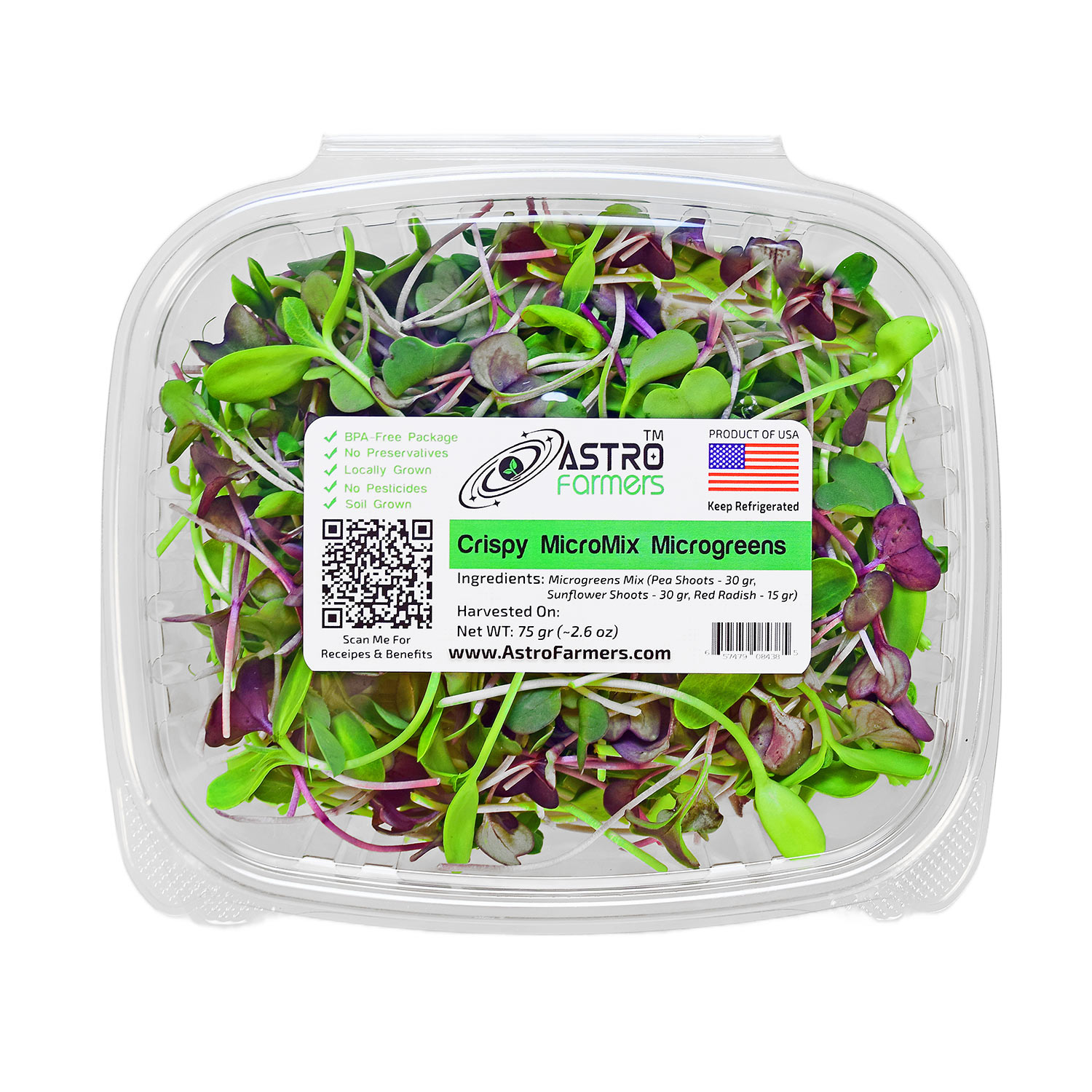
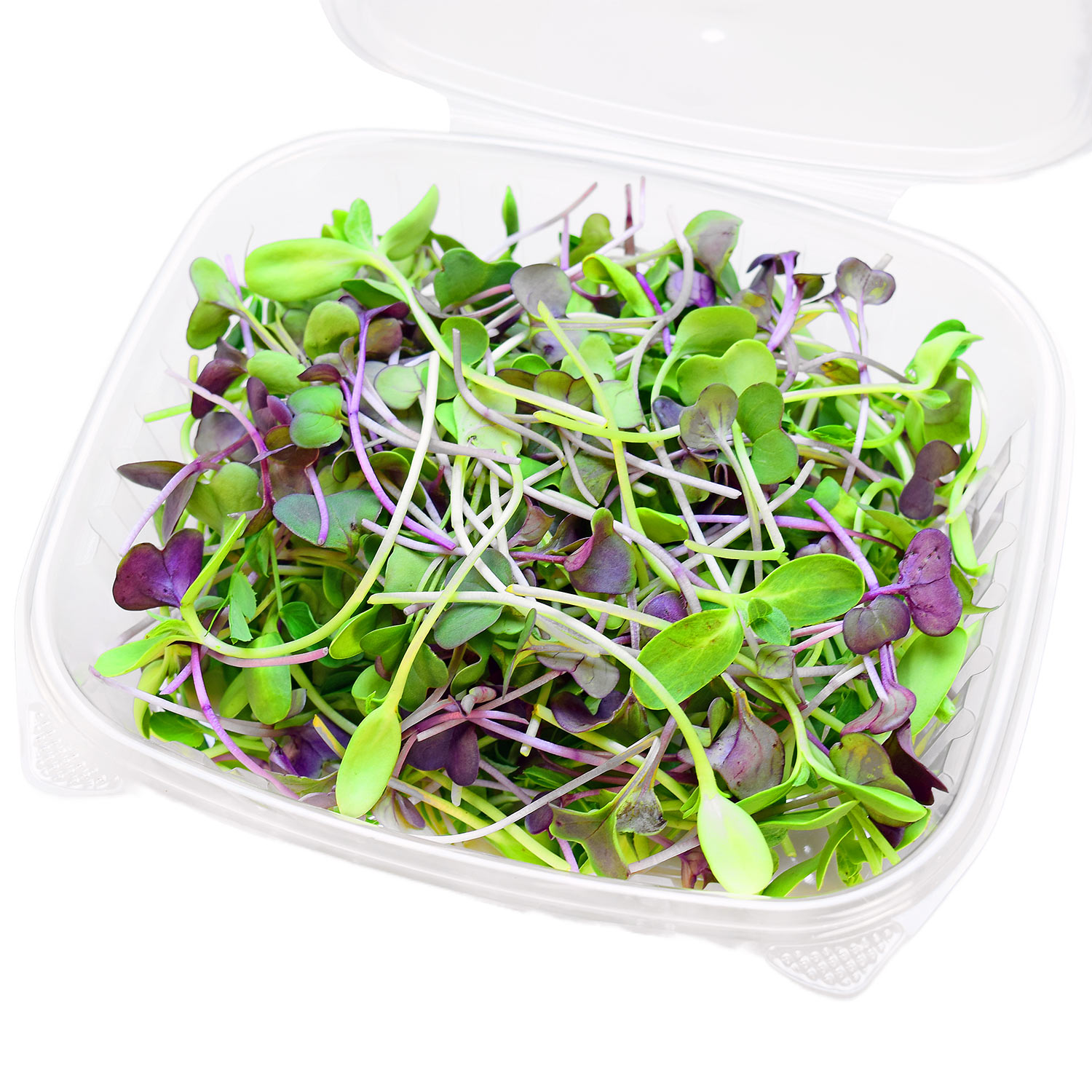

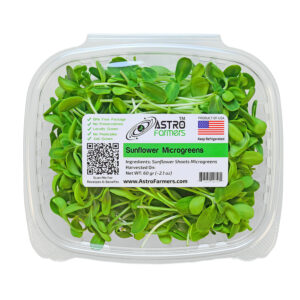
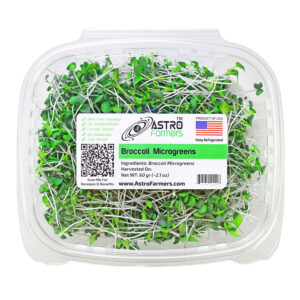


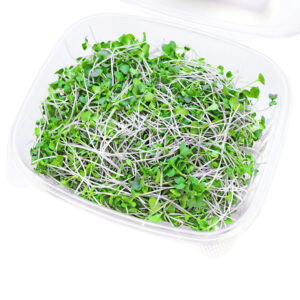
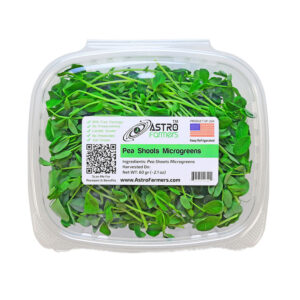
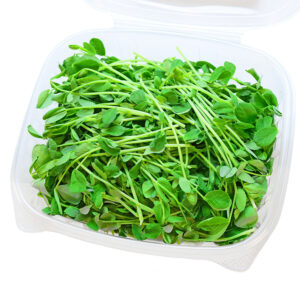
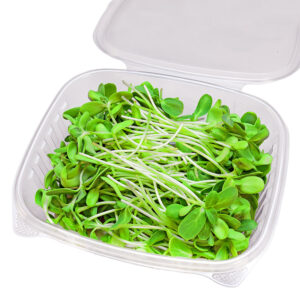
Reviews
There are no reviews yet.